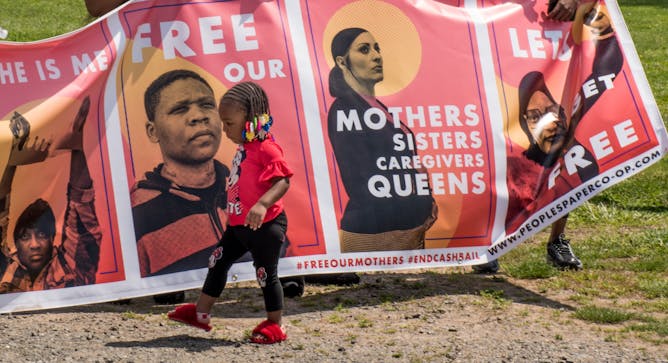|
|
|
|
We are just a few days away from Mother’s Day. It can be a complicated day for many, perhaps especially so for the more than 66 per cent of incarcerated women in prison who are mothers.
In today’s episode of Don’t Call Me Resilient in honour of Mother’s Day, we look at the fastest growing prison population in Canada – racialized women. Many of these women are also mothers, and experts connect the trend in incarcerated mothers to rising poverty and the attempts to cope with it.
A few years back, Canadian feminist sociologist Sarita Srivastava (who is my sister), the Dean of the Faculty of Arts & Science at OCADU, wrote an article for The Conversation suggesting we “reclaim the original intent of Mother’s Day,” as “a collective call to action.” Instead of putting your money toward a greeting card, she wrote, consider supporting a mother in jail and contributing to a Mother’s Day bail-out campaign near you.
In this episode, two experts speak intimately about the impact of incarceration on mothers. Lorraine Pinnock is the coordinator for a prison education project — and a formerly incarcerated mother. Rai Reese also joins us: she is a feminist sociologist at Toronto Metropolitan University and has spent years looking at carceral systems in Canada.
Also today:
All the best.
|

|
Vinita Srivastava
Host + Producer, Don't Call Me Resilient | Senior Editor, Culture + Society
|
|

Many women who are incarcerated were just trying to make ends meet for their families. Here an image from a rally to demand the release of people held in jails, outside the Riverside Correctional Facility in Philadelphia, May 2020.
Joe Piette/Flickr
Vinita Srivastava, The Conversation; Boké Saisi, The Conversation
For Mother’s Day, we look at the fastest growing prison population in Canada — racialized women, many of whom are mothers. Experts connect the trend to rising poverty and the attempts to cope with it.
|

U.S. President Joe Biden speaks during an event in Valhalla, N.Y., in May 2023.
(AP Photo/Evan Vucci)
Jason Opal, McGill University
If Democrats embrace and deploy the Constitution leading up to the 2024 election, it will enable them to offer a confident message based on the hallowed principles of America’s founding charter.
|

Team sport is an important activity to explore because it provides opportunities to build community, enhance health and well-being, and counter the often unrealistic and self-sacrificing expectations of motherhood.
(Shutterstock)
Talia Ritondo, L’Université d’Ottawa/University of Ottawa; Dawn Trussell, Brock University
Team sport provides postpartum mothers with opportunities to build community, enhance health and well-being, and counter the often unrealistic and self-sacrificing expectations of motherhood.
|

The end of the global emergency is the time to reflect on the lessons learned during the pandemic and how we can create more just and kind societies going forward.
(Shutterstock)
Yvonne Su, York University, Canada
The pandemic caused untold suffering around the world. It also created a new type of community solidarity rarely seen before. As we enter the post-pandemic era we must maintain that solidarity.
|

Better labelling of personal care products is necessary to inform consumers of ‘forever chemicals.’
(Shutterstock)
Amy Rand, Carleton University
PFAS are chemicals used in cosmetics and personal care products that can persist in the environment for a very long time. New regulations seek to ban PFAS, but Canada needs to take further actions.
|

A core focus of palliative care is on easing symptoms and increasing quality of life for people who have a serious or chronic illness, and not solely for those who are dying.
(Shutterstock)
Rachelle Patille, Simon Fraser University; Atiya Mahmood, Simon Fraser University; Gracen Bookmyer, Simon Fraser University; Sarah Canham, University of Utah
The challenging realities surrounding end-of-life care are especially difficult for older people experiencing homelessness, who have more barriers to accessing hospice care.
|
La Conversation Canada
|

Les experts et chercheurs des sciences sociales peuvent-il vraiment prédire des changements sociaux? Leurs avis durant la pandémie de Covid-19 indique que non.
(Shutterstock)
Igor Grossmann, University of Waterloo; Cendri Hutcherson, University of Toronto; Michael Varnum, Arizona State University
Les chercheurs et experts en sciences sociales ont peiné à prédire l’évolution de la société pendant la pandémie de Covid-19, révèle une vaste étude.
|
Arts
|
-
Alex Munt, University of Technology Sydney
Anderson’s film style is being rolled out across cultural and geographic borders. This syncs with the filmmaker’s affinity for global cinema.
|
|
Environment + Energy
|
-
Deonie Allen, University of Birmingham; Melanie Bergmann, Alfred Wegener Institute Helmholtz Centre for Polar and Marine Research; Steve Allen, Dalhousie University
Arctic sea ice algae contaminated with microplastics have serious consequences for ecosystems and the climate.
|
|
Science + Tech
|
-
Alan Christoffels, University of the Western Cape; Sofonias Kifle Tessema
Time and information is of the essence when tackling infectious diseases across countries and continents.
|
|
|
|
| |
| |
| |

|
| |
| |
| |
| |
| |
| |
|
|
|
|
|
|
|